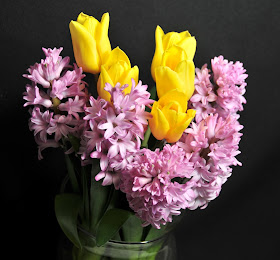The month of January beckons one of our favorite flowers out of the ground and into the market. Here in Arcata,
hyacinth season has begun.
Hyacinth are a classic bulb flower with a very passionate
fan base (myself included). They are a fascinating bit of flora--each stem has rows of intricate blossoms saturated in deep shades of blue, violet, white, pink, and yellow, each hue paired with a notable, super-heady fragrance. When
a hyacinth first begins to bloom, it produces a light floral aroma, but once the flowers fully open up the scent becomes intoxicating and powerful. To walk into a room that contains a vase of hyacinth smells like walking into a flower shop, or arriving on the tarmac in Hawaii, or entering an English garden full of sweet flowers--absolutely heavenly.
 |
| Purple, White, and Pink Hyacinth look great combined in a frosted vase |
Now, to get to the vase full of intoxicating fragrance takes a little bit of work (on our part). It all begins with the crop plan--which varieties get planted and when. Almost all our favorite varieties are part of the "
A-line" (with variety names such as:
Atlantic,
Anne Marie,
Antarctica, etc). We also stagger the plant dates--we have "early" varieties and "late" varieties of each color, which ensures that we are growing the strongest hyacinth for every season.
 |
| The "A-line" plus Blue Giant |
Once we receive the hyacinth bulbs, we immediately plant them in rich, soil-filled crates, which are then placed in a climate-controlled rooting room. There, our newly planted bulbs sit in the dark for 16 weeks, as we simulate winter and prepare them for their "spring" ahead.
 |
| Hyacinth sprouts (look for the tiny florets developing within the leaf structure) |
Once the bulbs have had their winter, their root structure will be fully developed and they will have started shooting their yellow-green sprouts skyward. At this point, we move the crated baby hyacinths into a specially designed warm, humid hoop house. We cover the sprouts with a cloth, which maintains the warm, moist environment--the heat, dark, and humidity work together to stretch the hyacinth stems to an enviable length of 12-14 inches.
Within one short week of being moved from rooting room to hot hoop house, the hyacinth foliage will be dark green, their clusters of bell-shaped flowers will be showing color, and they will be giving off their signature pungent aroma. They are now ready to be "pulled."
You'll notice I said "pulled," not "picked." Our
team gently pulls out the entire plant, making sure to leave the bulb
attached. We also do this with our soil grown
tulips, but it's a little different with the hyacinth, because we core the outside of the bulb off,
and keep the center. The bottom of this white bulb is called the “basal
plate,” and when left on, it allows nutrients to continue flowing to the flower, strengthening it and doubling its vase life.
 |
| Hyacinth Basal Plate--freshly cored |
Hyacinth Inspiration
The bright, saturated colors of a hyacinth's blossoms and its rich green foliage will brighten any room. One can get lost in the intricacies of its densely
packed flowers as well as its distinctive floral scent.
 |
| Intricate hyacinth florets |
|
They look great on their own, whether as a simple, single-color bouquet or combined with other colors. Hyacinths also look fabulous in mixed bunches. A flower that it complements really well is the tulip. Their
contrasting shapes and textures play well together and the variety of color combinations is limitless. Below, you can see a few simple, yet impactful,
tulip and hyacinth arrangements we made earlier this week.
 |
| Purple Atlantic hyacinth paired with orange World Favorite tulips |
 |
| Pink Anna Marie hyacinth paired with yellow Strong Gold tulips |
 |
| A simple and elegant Valentine's day arrangement: Red tulips and a single pink hyacinth |
Do you know why you love hyacinths yet? Is it because of their multiple rows of intricate blossoms? Is it because they are the "official flower" of the Persian New Year? Or is it their strong, ambrosia-like fragrance? Or is it because their season is limited to winter and spring, making their appearance extra-special? If you are not yet familiar with these unique blooms, give them a try,
let them charm you, and let us know why YOU love hyacinths.
And remember, for excellent hyacinth vase life, follow
their special Care and Handling Instructions: Keep the white basal
plate at the bottom of
the stem intact--don't trim them!












No comments:
Post a Comment